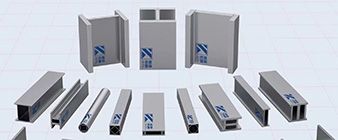High-performance weathering steel structures represent an advancement in steel construction, taking advantage of the inherent advantages of weathering steel and enhancing them to meet the needs of demanding applications. Let’s dig into the details:
The core concept revolves around maximizing the benefits of weathering steel (corrosion resistance, aesthetics and sustainability) while addressing its limitations and pushing the limits of its performance. This is achieved in the following ways:
Alloy Optimization: Refining chemical composition to improve mechanical properties such as strength, toughness and weldability.
Surface treatment: Innovative technology is used to accelerate patina formation, control its appearance, and further enhance corrosion resistance.
Advanced design principles: Use complex design methods to optimize structural efficiency, reduce material consumption, and extend service life.
Research and development of high-performance weathering steel is ongoing, and significant progress has been made in recent years:
Next generation alloys: Steelmakers have introduced alloys with improved strength-to-weight ratios, greater resistance to atmospheric corrosion and enhanced weldability.
Accelerated Rust Technology: A controlled weathering process that uses specific solutions or environments to quickly develop uniform and stable rust, reducing the time and uncertainty associated with natural weathering.
Performance-based standards: Industry standards and guidelines are being developed to ensure the long-term performance and durability of high-performance weathering steel structures.
A variety of high-performance weathering steels are emerging, each tailored for specific applications:
High-strength weathering steel: Provides higher yield and tensile strength, allowing for more slender and efficient structural designs.
Reinforced corrosion-resistant weathering steel: Designed for harsh environments with high humidity, high salinity or industrial pollutants.
Pre-Weathered Steel: Factory-applied treatment creates a consistent and beautiful patina, eliminating the uncertainty of field weathering.
Compared with traditional weathering steel, high-performance weathering steel structures exhibit superior performance characteristics:
Improved durability: Enhanced corrosion resistance means longer service life and less maintenance requirements.
Improved structural efficiency: Higher strength allows for lighter structures, reducing material consumption and base loads.
Enhanced Beauty: Controlled weathering process ensures an even and beautiful patina.
The enhanced properties of these steels open the door to demanding applications:
Long-span bridges: High strength and corrosion resistance are critical for bridges that are long-span and exposed to harsh environments.
Tall Buildings: Lighter structures reduce foundation requirements and allow for taller, more slender designs.
Architectural Landmarks: Unique aesthetics and durability make it ideal for iconic structures and sculptures.
Infrastructure in harsh environments: suitable for coastal areas, industrial areas and areas with high pollution levels.
High-performance weathering steel structures represent a promising direction for sustainable and aesthetically pleasing construction. Ongoing research and development will further improve its performance, expand its range of applications and solidify its position as a leading material for future infrastructure and architectural marvels.
-
 2024-9-20 2205 duplex stainless steel in water treatment industry applications
2024-9-20 2205 duplex stainless steel in water treatment industry applications -
 2024-9-20 Application of Ti Gr 7/3.7235/UNS R52400 Structural Hollow Stations
2024-9-20 Application of Ti Gr 7/3.7235/UNS R52400 Structural Hollow Stations -
 2024-9-20 1.4404 stainless steel structural profiles in civil engineering applications
2024-9-20 1.4404 stainless steel structural profiles in civil engineering applications -
 2024-9-29 Alloy 617 (N06617 / 2.4663) Structural Profiles
2024-9-29 Alloy 617 (N06617 / 2.4663) Structural Profiles -
2024-1-10 Stainless Steel – Austenitic – 1.4404 (316L) Bar and structural Section
-
 2024-9-19 How do the corrosion resistance characteristics of UNS S32570 and 1.4410 stainless steel structural profiles compare?
2024-9-19 How do the corrosion resistance characteristics of UNS S32570 and 1.4410 stainless steel structural profiles compare? -
 2024-9-29 Alloy 59 / 2.4605 Nickel-Based Alloy Structural Profiles: Beams and Columns
2024-9-29 Alloy 59 / 2.4605 Nickel-Based Alloy Structural Profiles: Beams and Columns



